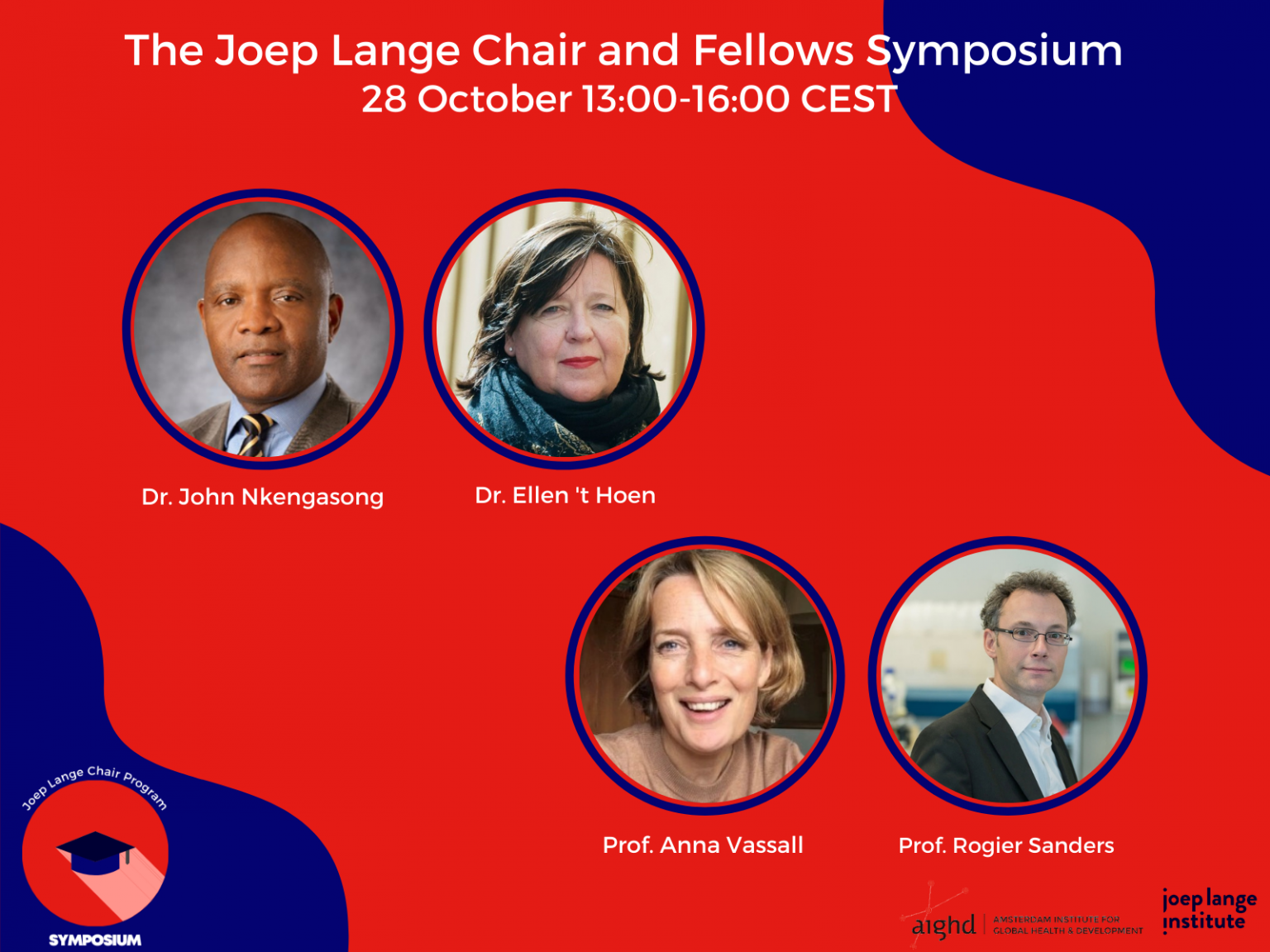While this year’s theme focused on vaccination, not covid specifically, the speakers were eager to discuss what the current pandemic has taught us about vaccine development, distribution, and access, and what we can learn for future diseases, epidemics, and pandemics. In the spirit of Dr. Joep Lange who was passionate about improving access to quality of care and advancing science for the benefit of society as a whole, the speakers of this symposium shared lessons learned, misconceptions around vaccination, and ways to improve vaccination moving forward.
Diverse set of speakers
The symposium featured a diverse set of speakers from different disciplines and different parts of the world – Virologist Prof. Rogier Sanders presented on experimental vaccinology, Prof. Anna Vassall gave a talk assessing the impact of vaccines from a health economics standpoint, Dr. Ellen ‘t Hoen discussed access and patents of vaccines, and director of Africa CDC, Dr. John Nkengasong, discussed vaccine development and access in Africa. Moderating the expert panel, was Dr. Roel Coutinho, former professor in Epidemiology and Prevention of infectious diseases and the director of the newly established Netherlands Center for Infectious Disease Control which is part of the National Institute for Public Health and the Environment from 2005-2013.
How does the vaccine really work?
Prof. Rogier Sanders kicked off the Symposium highlighting the lessons learned from his many years of HIV vaccine research that led to the SARS-CoV-2 vaccine. Prof. Sanders designs experimental vaccines, primarily for HIV, but his lab is also involved in working on the covid vaccine. But how does the vaccine really work? What research helped us swiftly develop this vaccine? These are some of the questions Prof. Sanders discussed in his talk. He also explained, “I think it is important to know that this pandemic actually helped move RNA vaccines forward, which is going to help us tremendously in the future.”

Sharing of the manufacturing knowledge
Speaking to the legislative gaps, barriers to access, and vaccine patents and manufacturing know-how was Dr. Ellen ‘t Hoen. She spoke about what should have happened in terms of vaccine manufacturing and rollout, and what is necessary for future pandemics. She explained why access to vaccines not only requires access to patents but also other forms of intellectual property (IP) such as data and knowhow. The covid-19 vaccine IP was developed with significant amounts of public financing which should have made the sharing of the manufacturing knowledge easier. She explained why this sharing did not happen. Ellen ‘t Hoen’s expertise is in intellectual property and she explained how matters of IP should be regulated better for example in a global pandemic treaty currently under discussions at the WHO.
Vaccine roll-out is possible
Health Economist Prof. Anna Vassall’s previous research has helped inform her current research on Covid vaccines, specifically in low- and middle-income countries. She, along with her team of researchers, have been able to draw on a base of research of other infectious diseases in the rapid way that is needed in the midst of a pandemic. During the Symposium, Prof. Vassall explained that essential health services face substantial financing and health system constraints, but vaccine roll-out is possible. The same challenge was faced, as she reminds us, during the early stages of the HIV pandemic.
Prof. Vassall draws a link between her current research and the namesake of the Symposium. “We all had a choice whether or not to focus on Covid research. For me it was important to use the skills and energy we have in global health research, and involve early career researchers, as this period will define the next generation of public health research”. Just as Joep Lange chose to research HIV and be an advocate during the early years of the HIV pandemic in Africa, Prof. Vassall hopes that the community built today around Covid will make a similar contribution in the decades to come.
Misconceptions, mischaracterizations, and challenges
As the voice of the African Center for Disease Control and Prevention, Dr. John Nkengasong closed the Symposium discussing vaccine access and distribution in Africa. Dr. Nkengasong stressed that, “it is of the common interest as humanity that the quickest way to get out of this pandemic is to vaccinate quickly. That seems not to have resonated across the board. We know this virus is mutating quickly. Even countries that are vaccinated are still being challenged by new variants”. He touched on misconceptions, mischaracterizations, and challenges in the African context. Finally, the audience heard lessons learned that have emerged from the pandemic, a major one being the manufacturing of vaccines.

